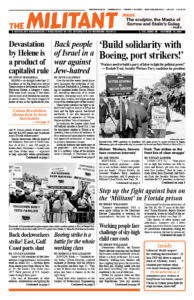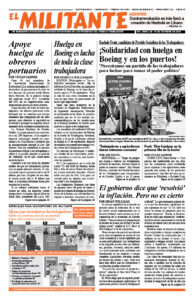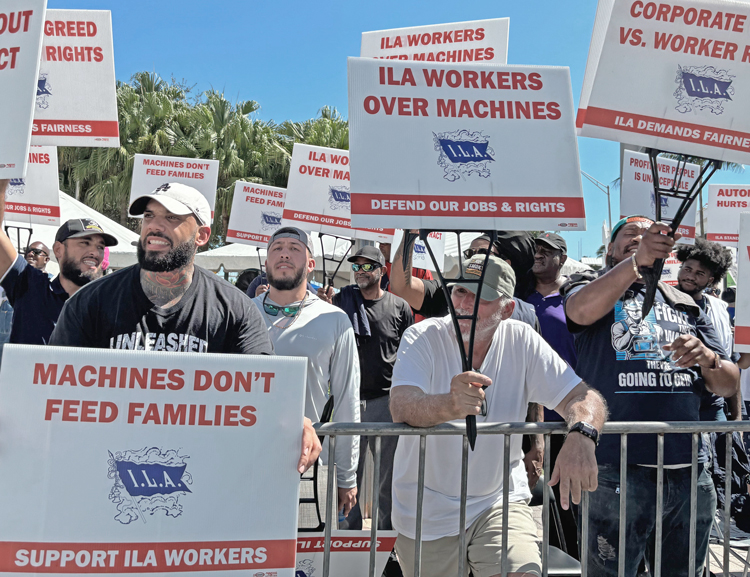Some 45,000 members of the International Longshoremen’s Association went on strike Oct. 1, shutting down three dozen ports from Maine to Texas. It’s the union’s first strike since 1977. Forty percent of U.S. imports come through these ports.
Like tens of thousands of other workers, dockworkers are fighting for a union contract that includes wage increases to offset today’s high prices, defend safety on the job and protect jobs under threat from increased automation.
The United States Maritime Alliance, the employers’ group representing nearly 200 businesses, has refused to negotiate seriously, pinning its hopes on the White House and calling for the administration to invoke the Taft-Hartley Act. That notoriously anti-labor law allows the president to force workers to return to work for an 80-day “cooling off” period. So far that hasn’t happened.
Despite headlines in the big-business media claiming dockworkers already make huge salaries, starting pay for dockworkers under the current contract is $20 an hour. After six years the pay can go up to $39 an hour, if you can get in enough hours to progress.
But if you don’t get enough hours, the salary doesn’t go up no matter how long you’ve worked, Mark Bass, president of ILA Local 1410 and the strike coordinator at the Port of Mobile in Alabama, told the Militant. “There are people who’ve worked even 12 years who aren’t yet at top pay.”
He said longshoremen often miss out on family time due to work schedules and are expected to be on call 24/7. “A ship can arrive midafternoon and workers will work on it until it’s unloaded, which can be many hours, even into the next day,” he said, “working under all weather conditions, in rain, sleet or even snow. On the other hand, when ships are not in port, we don’t get work.
“Safety is a big concern for the union,” he said. “The USMX is installing more and more automation, without regard for safety factors, without care for the human beings who work there.”
Tents are set up by ILA locals from all over Texas at the docks outside Houston. Pickets carried signs saying “No work without a fair contract” and “Fight automation, save jobs: ILA demands job security.”
The picket line was over 300 strong at the Bayport Container Terminal in Pasadena, Texas, Oct. 2. Car drivers and truckers passing by honked in support. Rick Johnson, a member of ILA Local 1351 that organizes clerks and checkers who verify cargo at the nearby Barbours Cut Container Terminal, told the Militant that the number of clerks at the gates has been cut from 30 to 2. “They are using automated scanners and eliminated these jobs.”
Jack Pennington, president of ILA Local 28 who works as a welder at the Bayport Terminal, told the Militant workers used to monitor temperatures on refrigeration units. Now it’s done by a remote system. One unit with plasma was supposed to be kept at 28 degrees below zero, he said, but the temperature went up, no alarm went off and the plasma had to be thrown out.
Tim Harris, the ILA vice president of the South Gulf Coast District, told the Militant, “We are asking for more money, but money makes no difference if there are no jobs.”
In Miami, Eugene Dixon, the president of ILA Local 1416, pointed to the fights by rail workers and the successful strike by 17,000 members of the Communications Workers of America in nine states across the Southeast. “This is the right time to fight,” he said.
A delegation from the International Longshore and Warehouse Union, which organizes dockworkers on the West Coast, joined thousands of ILA members and supporters on picket lines outside the Maher Terminals in Port Elizabeth, New Jersey, Oct. 1.
“When we fight, we win,” said Bobby Olvera Jr., president of the ILWU, telling the crowd that the ILWU from Alaska to San Diego, British Columbia and Hawaii stood with the ILA.
A growing number of international unions have announced their support for the strike. “We and our brothers and sisters in the ILA are fighting the same fight,” a statement by the SMART-TD rail union says. “By supporting our Longshoremen brothers and sisters, we not only advocate for their rights but also ensure the stability and integrity of our own industry.”
And the statement reminds members, “You are not obliged to cross a picket line.”
The Teamsters issued a statement of support, and Sean O’Brien, the union’s president, joined the ILA picket line on the Boston docks Oct. 1. “The U.S. government should stay the f**k out of this fight,” the Teamsters said, adding, “Don’t forget — Teamsters do not cross picket lines.”
The Association of Flight Attendants-CWA also backs the strike. “Solidarity with the ILA workers fighting corporate greed to get the contract they deserve!” they said. “Their fight is our fight.” These flight attendants continue efforts to organize workers at Delta Airlines, organizing a rally at Delta headquarters in Atlanta Oct. 3.
Boss press smears the ILA
The bosses have worked overtime to slander these workers and their union. As union pickets were being set up on the first day of the strike, the New York Post wrote that ILA President Harold Daggett “lived in luxury, owning a yacht and driving a Bentley — and fought off alleged ties to the Mafia.” That “Dude had more yachts than me!” Elon Musk posted on X.
The Post article dredged up two 2005 Justice Department cases that charged Daggett with being an “associate” in the mafia. He was acquitted in both.
Over decades Daggett and the ILA have fought to expose the New York-New Jersey Waterfront Commission as a union-busting outfit. He called the commission’s accusations of mob ties total fabrications and a “dark, ugly attack on Italian Americans.”
This strike will be a battle. Build solidarity! Join a picket line. Help get out the word!
Susan LaMont in Atlanta, Alyson Kennedy in Houston and Laura Anderson in Miami contributed to this article.


